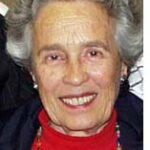By Eileen Wingard

SAN DIEGO — Michael Roth is an accomplished composer, with over 250 scores for theater productions throughout North America to his credit.
This outstanding local Jewish artist had two of his compositions featured as part of the 24th Lipinsky Jewish Arts Festival at the Lyceum Theatre. The works not only utilized Roth’s music, but had interesting theatrical elements.
The first, Labor Day 1967 for 78 Recording, Turntable, Violin, Percussion, Prepared Piano and Singer was inspired by Roth’s discovery of the 78 Recording of his Bar Mitzvah Parsha when he cleaned out his parents apartment. He used the actual Parsha as the musical basis for his piece, piping in the sounds of the old recording and having the violinist play music which began in unison with the recording, then became counterpoint, variation and commentary to the recorded sound. The violinist was Batya MacAdam-Somer, one of the two violinists of Quartet Nouveau.
After about a page of music with violin and recorded sound, the singer, William Tiep, entered and began singing along with the recording. He seemed to represent the bar mitzvah boy chanting his Torah portion. Tiep sang with beautiful resonance and feeling, as might be expected from the talented Cantor of Temple Solel in Encinitas. The Parsha was Deuteronomy 16:18 (Shofetim) containing the famous words: “Justice, justice shalt thou pursue.” Later in the piece, N. Scott Robinson began playing embellishments and musical commentaries of the recorded sounds on a prepared piano. Tiep joined Robinson at a lectern beside the piano at what might have represented the bima of the temple. The piece ended with Robinson removing the record player arm from the recording.
This merging of music and theater, voice and instruments, successfully portrayed to this listener, the inner feelings of Roth at his Bar Mitzvah. It was original, unusual, cutting edge, yet utilized the Ashkenazi synagogue tropes as its musical basis.
The second work by Roth, the title of the entire program, was Imagination Dead Imagine. This was the name of a piece written by the famous Irish writer, Samuel Beckett. Roth received permission from Beckett to set music to his words.
The words were piped in, read by five different readers. Unfortunately, the readers’ words were not always audible. The music, played by the capable Quartet Nouveau, often overpowered the narrative; thus the intense passage work, the rapid tremolo, the disconnected dissonances did not always have relevance. Of the words I did catch: “No trace anywhere of life..Leave them there, sweating and icy..There is better elsewhere…Life ends..No nothing,” conveyed a bleak mood of cold emptiness and death.
Although the music was often stark and screaming, it ended with some beautiful, soothing string writing, after the words had ceased. The final close was a sustained unison note in all four strings. One at a time, they dropped out and the light on them turned off until, finally, only one violin sustained the tone until her light was also extinguished.
Hopefully, the next time this work is performed, the balance between spoken words and music will be improved so that the full impact of Roth’s music and Beckett’s narrative can be fully appreciated.
Between the two Roth works, the four musicians of Quartet Nouveau, violinists Missy Lukin and Batya MacAdam-Somer, violist Annabelle Terbetski, and cellist Elizabeth Brown acquitted themselves heroically in Beethoven’s early quartet in D Major, opus 18, #3. Even in his early quartets, this great master displayed remarkable skills in the development of his themes and his romanticism.
Perhaps Roth programmed the Beethoven to proclaim, with just reason, that he, too, is a master of his craft. Perhaps, it was programmed between the two Roth pieces as one might serve sorbet, as a palette cleaner between courses in a French meal. Or, perhaps, to take up the time and use the expertise of the performers in a work from their normal repertoire.
In any case, it made for pleasant listening. However, Beethoven was not Jewish, and there was no Jewish element in the music, therefore, this seemed to have no place in a Jewish Arts Festival. Yet, one might make the case that
Beethoven had Jewish publishers and much of his music continues to be played because Jews are great supporters of classical music. In our city alone, we can point to people like Joan and Irwin Jacobs, the late Anne and
Abraham Ratner, Allison and Robert Price and the Warren Kesslers, whose San Diego Symphony support has given us much Beethoven, season after season.
Although past festivals have devoted an evening, occasionally, to classical music, performances by violinists, Zina Schiff, Eugene Ugorski, Rachel Barton Pine, bassist Bert Turetzky, flutist, Er’ella Talmi, come to mind, they were usually devoted to serious Jewish music.
This program, featuring two world premieres by Michael Roth, is to be applauded, mainly, for showcasing the great talents of a San Diego resident. But, rather than Beethoven, how about Bloch, Copland or Bernstein next time?
*
Wingard, a retired violinist with the San Diego Symphony, is a freelance writer specializing in the arts. She may be contacted via eileen.wingard@sdjewishworld.com